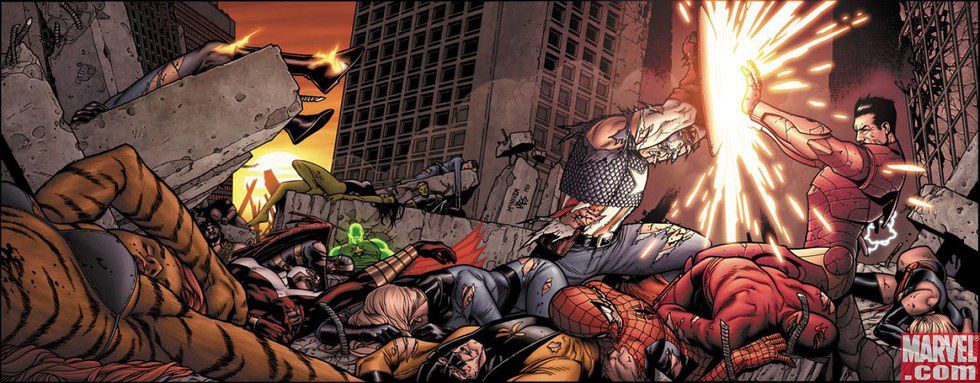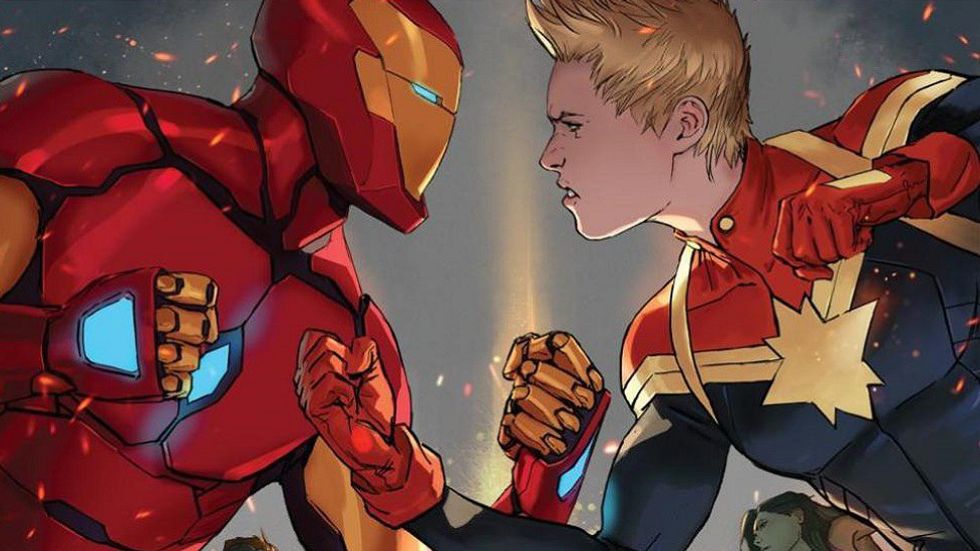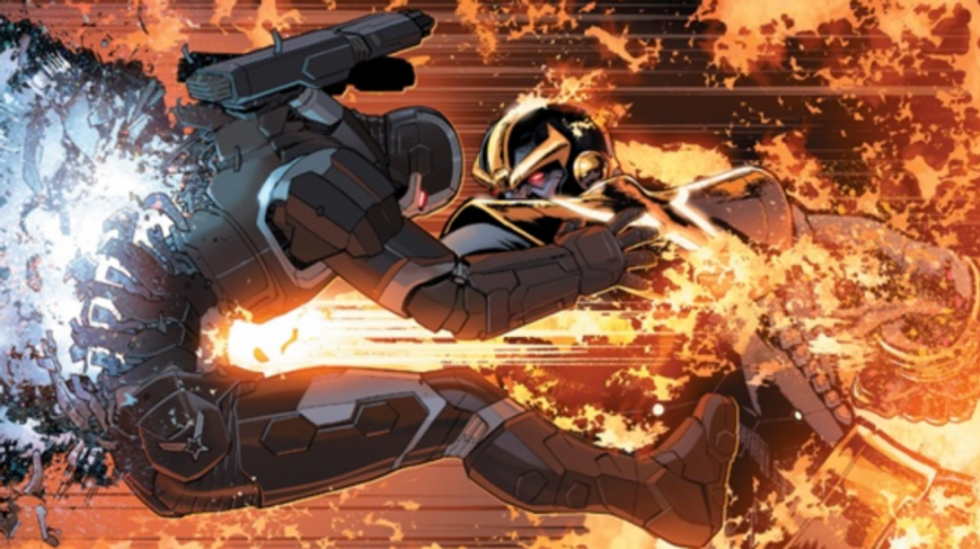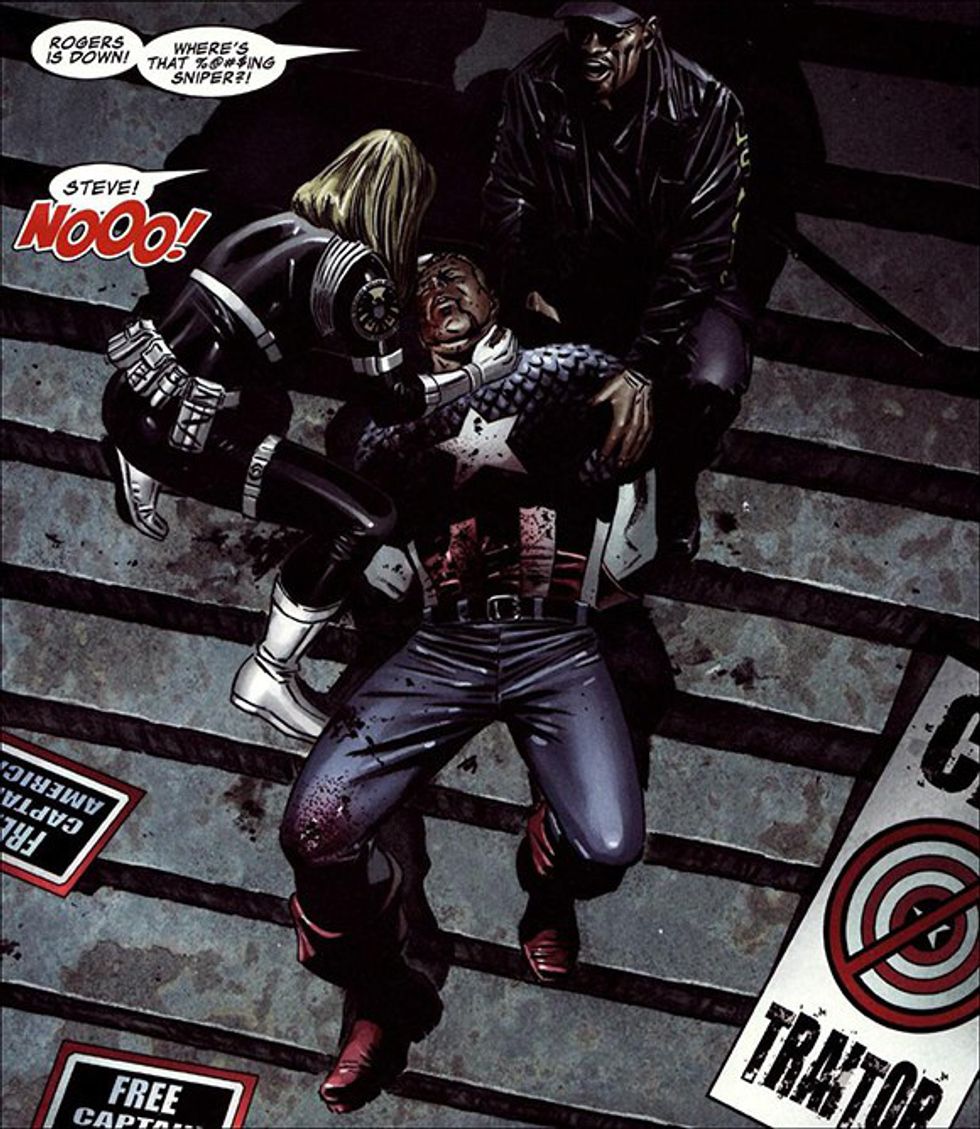"Civil War II" is a tragedy in motion. No, it’s not because it’s the super hero community crumbling (again). No, it’s also not because War Machine and the Hulk are now both dead (in fact, I’ve never felt so little about the deaths of characters I really liked).
No, "Civil War II"is a tragedy because it’s a skilled veteran writer and a talented up-and-coming artist using an interesting premise with a lot of potential to absolutely self-destruct. This story is a train wreck. It’s a five-car pile-up of plots and characters with no direction or coherency.
Is "Civil War II" the worst crossover I’ve ever read? No, that prize is shared by" Avengers vs. X-Men" and "Convergence." Is it even really horrible? Not really, no. Parts of it actually really work. That’s what makes it more painful to watch it stumble and brain itself with a rock. It could work. It almost does, but it makes so many missteps on the path to greatness.
Now, I must confess. I stopped reading at Issue 3, though I do know some of the plot beats that have transpired since then. What I have heard only solidifies my opinion. Money isn’t infinite. I’m not going to blow mine five dollars at a time on a story that isn’t engaging me.
Let me also say that I am not blaming Brian Michael Bendis and David Marquez entirely for the failure of "Civil War II." I know a lot of hands stir the pot on this type of story, and I know that corporate mandates are usually involved too.
To explain why this story is such a flop, I’m going to compare parts of it to corresponding qualities of the original "Civil War" by Mark Millar, which is my all-time favorite comic crossover. It's been getting a lot of flak recently as people reevaluate its merits, but I still think it's great. So think of this as critiquing the new while defending the old.
Marvel’s original "Civil War" was lightning in a bottle. It was a dramatic, socially relevant and unprecedented masterpiece of graphic novel story-telling by a mercurial writer. Marvel should have known that it could not be done again the same way. The "Battleworld: Civil War"miniseries during "Secret Wars" worked because it wasn’t trying to retell "Civil War." In the same right, "Captain America: Civil War"worked because it took the main ideas, fit it to MCU’s version of the universe and characters and scrapped the rest.
To the credit of"Civil War II," it’s not trying to retell "Civil War," or at least not completely. The story is structured differently, there isn’t really government involvement and the teams are assembling in a different manner.
Let’s start with the character dynamics of the two team leaders. Captain Marvel is a strong character, and I can see how and why she was chosen as one of the two heads of the story. I love Carol Danvers. She is one of my favorite Marvel heroes. However, she doesn’t have the long-standing animosity towards Iron Man that Captain America had. Honestly, no two heroes have really had the animosity towards one another that Steve Rogers and Tony Stark have shared in the past with the possible exceptions of Cyclops and Wolverine or Daredevil and the Punisher.
That’s one of the main things that made Mark Millar’s "Civil War" work so well. Yes, it was two groups of super heroes duking it out over federal legislation, but, at its core, it was also two men airing out their personal grudges with one another. Captain America is an idealist, and Iron Man is a pragmatist. They are philosophical opposites in terms of their motivations, and this made them perfect rivals.
All-new, all-different Marvel has been trying to rebrand Tony Stark as a fun-loving and philanthropic industrialist super hero, but all that really does is make him not seem like one to take up arms over this kind of thing. Plus, he’s still a futurist, so you’d think he’d want an eye on the future. Yes, he said in the story that being a futurist is about “protecting” the future, but I kind of call bull crap on that.
Captain Marvel being made into this super hero is kind of at the heart of everything with Alpha Flight, A-Force, and the Ultimates. She has been shown as the put-upon and stressed-out top tier hero who is trying to hold everything together. Honestly, this does work in terms of making her the one who is all about using Ulysses’ powers. Maybe her opponent should have been Sam Wilson-Captain America. I could have seen that.
Point being, Captain Marvel versus Iron Man isn’t exactly the rivalry of the decade. They’ve worked together a lot in the past, and they have historically had very similar philosophies on how to operate. Heck, they were on the same side in the original "Civil War."
The next thing we’re going to look at is the catalyst. Both stories had two main catalysts. For "Civil War," as you likely know, it was the Superhuman Registration Act. This was a bill that made it so that super heroes had to work for the government and expose their identities. This was preceded by the “Stanford Incident,” where a group of young heroes called the New Warriors battled an ultra-powerful villain called Nitro the Exploding Man on a reality television show right next to an elementary school. Nitro detonated, killing 616 people, including the New Warriors themselves. It is entirely feasible that many heroes would begin to doubt themselves and think the SRA was a necessary precaution.
One thing about the Superhuman Registration Act that is simple yet important is that it is a binary, yes-or-no decision. You sign it or you don’t. If you do, you get to continue your superheroing under the government. If you don’t, you have to retire or be treated as a fugitive by the United States government and S.H.I.E.L.D. Every American-based hero has to choose between one or the other.
The creation of Ulysses is one of the two main catalysts for "Civil War II." He is an Inhuman who receives visions of the future which have had 100% accuracy. Sometimes these visions are shared by people who are nearby. This followed the death of War Machine at the hands of Thanos on a mission and was sparked by a vision from Ulysses. This has a major impact on both Carol Danvers and Tony Stark, as he was the boyfriend of the former and the best friend of the latter. Danvers now wants to keep using Ulysses to try to prevent further tragedies before they happen. Stark sees this power as too much to use and blames Carol for Rhodey’s death because she mandated the mission to stop Thanos.
Here's the thing. There is a middle ground here. This is not a binary decision, so drawing lines in the sand feels a bit forced and contrived. They could be wary of Ulysses’ visions and not automatically turn to near-fascism as Carol Danvers does. You also don’t have to ignore Ulysses completely like Tony Stark wants to. Furthermore, it does make sense that Tony would be mad at Carol, but it doesn’t feel like he should automatically view Ulysses as the root of the problem. What about Captain Marvel’s gung-ho nature? What about Thanos himself? You know, the person who actually killed War Machine.
The fight just seems so contrived and as a result feels less tense and less engaging. I can’t bring myself to care much about the fight because I think they’re both wrong. With "Civil War," you are put in a position in which you have to choose one or the other because there are only two decisions on the matter (Ben Grimm leaving the country and Wolverine hunting down Nitro notwithstanding).
With the manner in which things are set up, the death of the Hulk almost seems like it should be the main catalyst to the fight because it better exemplifies the fears Tony Stark has about Ulysses’ visions. War Machine’s death really had little to nothing to do with it, and what was the alternative? Let Thanos do whatever he wants on Earth? If Rhodey must die, couldn’t it have been before Ulysses is discovered and be more of a motivation to Carol to use his visions? It could have been something like, “Here’s something we could have prevented with an early warning system.”
Next comes the pacing. "Civil War II"is paced very weirdly. Each issue feels like it takes place months apart from the previous one. It feels oddly disjointed, and there is no urgency to the events. There is no ticking clock, so tension is lost.
Furthermore, things that should only take a couple of pages to tell last entire issues, and things that should have an entire issue to be explained are only given a couple of pages. Case in point, the first issue is entirely given to the rising tension over Ulysses, and the aftermath of the death of Rhodey is only given a couple of pages towards the end. You can establish that tension in a lesser amount of time.
The pacing of "Civil War" was near-perfect. Once the fighting started, it kept going. Every issue followed up the previous one perfectly. The immediacy is there. Iron Man and his Avengers are constantly hunting Captain America and his Secret Avengers. They could be discovered at any moment. They can’t stay underground though, because they have to prove to the public and the government that the old ways can still work. The tension is palpable.
The last element I will discuss is the deaths. This is a bit simpler to explain. War Machine’s death isn’t really given time to sink in within the story, and it’s not really meaningful. It has no real narrative meaning in regards to what James Rhodes is about, so it feels empty and entirely done for dramatic effect. Meanwhile, the Hulk’s death seems like a completely empty gesture. There is more meaning to his death, i.e. he was always hunted as a monster and now he dies for what he may do. However, this is a Marvel comic, and he’ll be back soon. This is the company that killed Thor to bring him back and kill him again and bring him back again in a span of two years.
Goliath AKA Bill Foster’s death felt more effective in "Civil War." It happened as a result of the fighting. Though he had been inactive for some time before the story, he was made to be likable and engaging within the story, so it hurt to watch him get killed. It was quite macabre too, and it was a shock to Iron Man’s system in addition to enraging Captain America. When Cap himself died at the end, it had a tinge of finality to it. Yes, he was brought back a year and a half later, but it was still meaningful. He died trying to protect a police officer who was arresting him. What more Captain America way is there to die? Plus, it kind of represented the death of the super hero dream. His side lost, his Avengers were now fugitives, and the “official” heroes were now government agents.
Like I said, Mark Millar’s "Civil War"was lightning in a bottle. I didn’t really expect "Civil War II" to be better than or on par with the original. I did hope it would be good though, and it just wasn’t. It’s a spectacular disappointment, and it could have been way better. The elements are there for a good story. They just didn’t coalesce.























